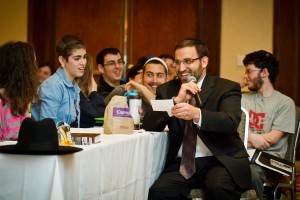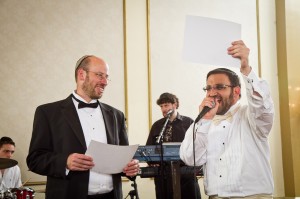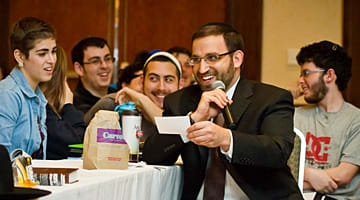
Thousands of teens across the United States and Canada have learned under his guidance to take pride in their Jewish heritage, but now Rabbi Yaakov Glasser, longtime director of NJ NCSY and international director of education for NCSY, the international youth movement of the Orthodox Union, is taking on a new role. February 1 marked the beginning of his appointment as associate dean of Yeshiva University’s Center for the Jewish Future and he will be engaged in various aspects of university life.
“Leaving NCSY was one of the hardest decisions I’ve ever had to make,” Rabbi Glasser recounted. “I don’t feel that I’m leaving NCSY insomuch as I’m taking my diverse NCSY experiences and impacting a broader constituency by working with communities across North America on behalf of Yeshiva University.”
Rabbi Micah Greenland, international director of NCSY, described Rabbi Glasser’s impact on NCSY as “tremendous.”
“Rabbi Glasser is a dear friend and a cherished colleague and someone from whom we’ve all learned a great deal,” he said. “We will miss him and look forward to working closely with him in his new capacity.”
Allen Fagin, chairman of NCSY, praised Rabbi Glasser as a “profound intellect, a master teacher, a passionate leader, an incisive visionary, and a side-splitting comic — take your pick — each of these sobriquets fits Rabbi Glasser without exaggeration. He is a rav and a rebbe — keen of mind, keen of heart, and relentless in his love for Klal Yisroel.”
Rabbi Glasser’s career in kiruv was somewhat inadvertent, he admits. In a sense, it was launched by a song.
Rabbi Glasser has been involved in NCSY for most of his life. He grew up in a loving household that was always open to guests. His parents, Paul and Rachel, met as NCSYers and Rabbi Glasser and his wife Ruth met as co-presidents of the Beverly Hills chapter. After the two married, Rabbi Glasser became director of education for NCSY Juniors and then served as director of Junior NCSY.

However, after a successful stint in that position Rabbi Glasser was ready to move on. That was when Shira Reifman, then-interim international director of NCSY, approached him about taking over the Jewish Student Union clubs in the New Jersey region. JSU Clubs were rapidly having an effect on unaffiliated public high school teens across the country. Teens came for the free pizza but left inspired by their Jewish heritage.
“It was an impassioned plea to devote some years to outreach,” Rabbi Glasser recounted. “She explained how the Jewish people are really assimilating and this is the key window: the teenage years.”
Reifman made an impression on Rabbi Glasser, but the prospect of spending the next few years of his life in kiruv was daunting, nonetheless. Then, Rabbi Glasser flipped on his tape deck as he drove away from Starbucks and Mordechai Ben David filled his car with “Someday.”
“Someday, we will all be together / Someday, we’ll be sheltered and warm,” Ben David sang.
The song, Rabbi Glasser recalled, seemed right for him at that exact second: a vision of what NCSY hoped to accomplish. He called Reifman later that night and accepted the position. Under his leadership, the JSU clubs of New Jersey NCSY blossomed and participation in New Jersey NCSY skyrocketed. Shortly thereafter, on an El Al plane, flying back from a JSU conference in Israel, Rabbi Steven Burg, then the international director of NCSY, began a discussion about committing to a career in outreach, and ultimately offered Rabbi Glasser the position of regional director in New Jersey. At the same time, he received an offer to become the rabbi of the Young Israel of Passaic/Clifton, a shul known for its warm and welcoming atmosphere that had long been a bastion of NCSY support. The positions were a natural fit, though juggling two jobs was only possible, he added, thanks to his “amazing supporting wife,” Dr. Ruth Glasser, “who is, without question, responsible for everything we were able to do.”
The next several years were a period of unrestrained growth for NCSY in the Garden State. Rabbi Glasser’s havdalah ceremonies at Shabbatons became the stuff of NCSY legend. He oversaw a structural transformation that saw New Jersey NCSY refocus on outreach to unaffiliated Jewish teens and build up a network of JSU Clubs around New Jersey from three clubs to 20, while also launching weekly Latte & Learn programs in five cities. Instead of chapters staffed by part-time college advisors, Rabbi Glasser helped develop NCSY’s city director program, hiring couples to embed themselves full-time in the day-to-day lives of Jewish communities. With Rabbi Glasser at the helm, New Jersey NCSY came to embody the possibilities of NCSY. But the achievement in which he takes the most pride remains the Torah he was able to imbue into each program and every relationship New Jersey NCSY had with teens.
“The foundation of all of our kiruv and chizuk work was in cultivating meaningful and substantive relationships with teens — and within those contexts — educating them in substantive Torah ideas,” he said. “Talmud Torah was the ultimate metric of our success. It was the basis for all of the people I hired — and fundamental to what we were trying to accomplish.”
Three years ago, Rabbi Glasser was asked to assume another responsibility, that of director of education for International NCSY. In his new position, Rabbi Glasser took the success of New Jersey NCSY and helped apply its methods to NCSY regions across the country.
While Rabbi Glasser remained as regional director, that was only possible, he said, due to the efforts of his dedicated New Jersey staff.
“I always looked to surround myself with people more talented than I was in the areas that they were assigned to,” he said. “The greatest moments of management are when one innovates an idea and one’s staff can translates that idea into a reality that far eclipses anything originally imagined.”
One example he offered was the free carnival for the children of Hoboken that NJ NCSY ran after Hurricane Sandy destroyed parts of their community. Rabbi Glasser recalled that he had felt having a Shabbaton after the storm without a social action component would send the wrong message to teens. He came up with the idea of the carnival and his staff developed all the particulars, from the booths the teens ran to working with local government officials to orchestrate the event. Rabbi Ethan Katz will be assuming the mantle of NJ NCSY regional director after serving under Rabbi Glasser as the associate regional director of NJ NCSY since 2009.
Even though he’s officially leaving NCSY behind, it appears to have made a permanent impact on the Glassers’ children: Rina, 12, Chaim, 11, Neima, 8 and Meira, 4.
“From the time they were infants my kids have been coming to Shabbatons and it has affected them dramatically,” he said. “My kids have a tremendous comfort level around other Jews no matter their level of religious observance.”
And NCSY, in turn, has had an effect on him.
“NCSY attracts talented people with lots of potential,” he said. “It trains and nurtures their abilities – and ultimately provides the Jewish community with its cadre of leaders whose impact on the broader community can always be traced back to the mentorship and experience they gained within this remarkable organization.”
Rabbi Steven Weil, Senior Managing Director of the Orthodox Union, said that while Rabbi Glasser’s departure is a loss for the organization, it is also a testament to NCSY’s success.
“Rabbi Glasser grew up with NCSY and it is a part of who he is,” Rabbi Weil said. “Yaakov is one of the most talented and thoughtful educators the Jewish community has. We can’t help but feel a certain amount of pride, mixed with our sadness, as he moves to a broader stage. As we celebrate NCSY’s 60th anniversary we celebrate individuals like Rabbi Yaakov Glasser, who ensure that Jewish teens across the world know that our Torah truly is the Tree of Life.”
The words of this author reflect his/her own opinions and do not necessarily represent the official position of the Orthodox Union.
